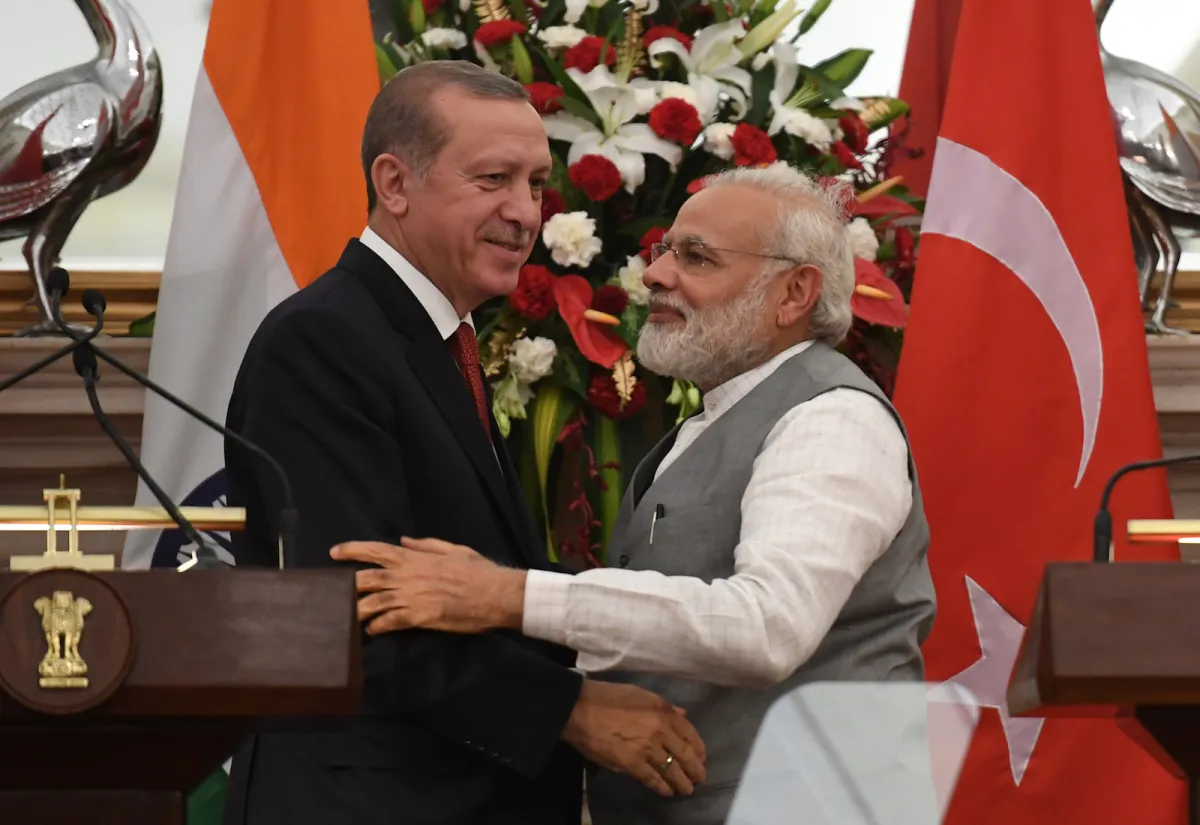Authoritarian Populism in the Global South
Alf Gunvald Nilsen
During the 2010s, many states across the global South turned decisively to the right. Foreshadowed by the rise of Recep Erdogan in Turkey in the early 2000s, a wave of authoritarian populism swept political figures like Mahinda Rajapaksa, Jair Bolsonaro, Rodrigo Duterte, and Narendra Modi into power with very substantial popular mandates. More recently, Javier Milei secured victory in a face-off with centre-left candidate Sergio Massa in Argentina’s presidential election, and elsewhere, for example in South Africa and Indonesia, southern authoritarian populism constitutes a significant undercurrent that is shifting established political terrains in important ways.
However, whereas authoritarian populism is a political force to be reckoned with across Asia, Latin America, and Africa, it is Euro-America, as Gillian Hart has noted, that remains the focus of the vast bulk of writing on far-right politics in the current conjuncture. If we agree that it is an important task to address this bias and to conceptualise southern authoritarian populism in its own right, it is also necessary to ask ourselves how we should approach this task – in short, how should we study authoritarian populism in the global South?
In my current work, I attempt to do this by breaking away from one of the dominant trends in Euro-American scholarship, which is to focus on the performance of right-wing populism as a distinctive political style. Such approaches have yielded insights into the discursive logic of right-wing populism, but they have had relatively little to say about the political economy of authoritarian populism. In contrast, my ongoing research shifts the focus of attention back to the interplay between accumulation strategies, class formation, and forms of the State. Most fundamentally, I ask how authoritarian populism works as a hegemonic project in a specific conjuncture of uneven development across the regions of the global South.
In addition to borrowing the key concept that I use in this work – authoritarian populism – from Stuart Hall, I also take my more general bearings from his notion of conjunctural analysis. I am more concerned with understanding what Hall referred to as strategic shifts in the political and ideological conjuncture, than with the level of pure theoretical abstraction in which Marxist scholarship is often excessively invested. The reason for this is simple: our conjuncture is one in which the stakes are too high to waste time on the higher mysteries of abstract theory. If we instead clarify our understanding of the workings of southern authoritarian populism as a concrete political process, this might serve as a modest contribution to a wider debate about the kind of counterhegemonic collective action that is required to disrupt, effectively, such reactionary projects.
Uneven geographies of development
Where do we begin to build such an understanding? My suggestion is that we start with the changing coordinates of early twenty-first century development. Most countries across Asia, Africa and Latin America are today middle-income countries. This is a result of processes of economic growth which have challenged developmental cartographies that pivot on a simple counterpoint between a rich North and a poor South. Indeed, some scholars read these trends as pushing towards economic convergence across the North-South axis of the world-system. It is undeniable that between-country inequality has decreased in recent decades. However, what some think of as a new geography of development, is also a new geography of poverty.
In fact, as Andy Sumner’s work has shown, more than 70% of the world’s poor live in Southern middle-income countries. This poverty, in turn, is intimately linked to deepening inequality rather than to an absolute dearth of material resources. In his most recent work, Sumner attributes this to the nature of economic growth in the global South after the end of the Cold War. Since the 1990s, he argues, Southern growth processes have hinged on integration into global value chains. While this has offered a pathway from low-income to middle-income status for many countries, it is ultimately a diminished form of industrialisation characterised by falling labour shares of income, weak employment growth, and an expanding informal sector; which has served to reinforce the dependency dynamic discussed by scholars such as Walter Rodney (1972), Samir Amin (1974), and Fernando Cardoso and Enrique Faletto (1979). As within-country inequality deepens, various degrees of precarity are very much the norm.
We need to conceive of these dynamics in more complex terms than those offered by the notion of “middle-income traps” that countries can escape by applying technical policy tweaks. Instead, we must understand that we are confronting what Toby Carroll has referred to as the death of development. This is a result of how neoliberal accumulation strategies are centred on forms of low-level profit-oriented activity that cannot bring about the kind of structural transformation and material progress that is normally associated with the term ‘development’. And this also explains why, as Tania Murray Li has argued in a recent intervention, it is no longer possible to think of capitalist development in terms of transition narratives.
This scenario is profoundly turbulent. The 2010s, we do well to recall, was a mass protest decade across the global South, beginning with the Arab uprisings of 2011 and 2012, and culminating with mass revolts in countries like Chile and Lebanon in 2019. What this signifies is that the very same accumulation strategies that have propelled the so-called rise of the South have thrown up crises of legitimation for governing elites across Asia, Latin America, and Africa. These crises have the potential to destabilise and disrupt hegemonic configurations in very substantial ways. In this sense, the current conjuncture can well be thought of as an interregnum in Gramsci’s sense of the term – that is, as a long and drawn out period of organic crisis, in which the old is dying while the new cannot be born. And southern authoritarian populism is one of those “morbid symptoms” that tend to appear in such conjunctures.
Constructing consent for authoritarian populism
In essence, southern authoritarian populism is best understood as a hegemonic project that seeks to shore up subaltern consent for neoliberal orders that for most, if not all, intents and purposes are dead, but which cannot be laid to rest because of the vested interests of the elites of southern countries who stand to benefit from them. But how exactly is subaltern consent won for authoritarian populism? After all, these are conservative hegemonic projects that pursue neoliberal accumulation strategies which only deepen the inequality and precarity that has come to define growth processes in Southern middle-income countries. A central part of any answer to this question has to reckon with the fact that, across democracies in the global South, authoritarian populism has managed to harness complex structures of feeling that permeate precarious subaltern lifeworlds.
What I refer to here are those emotional cultures of precarity that Harry Pettit has identified in his work on unemployed young men in urban Egypt, in which attachments to aspirations of social mobility and affluence – aspirations that are unlikely to be realised – intertwine with anxieties about social decline and the disaffection that such anxieties engender. Such composite structures of feeling naturally prevail in contexts where many people inhabit “a fuzzy zone between absolute poverty and security from future poverty”. It is in this zone that authoritarian populism does crucial hegemonic work for governing elites and dominant groups across large parts of the global South in the early twenty-first century.
Across national and regional contexts in the global South, authoritarian populism propagates political vocabularies which draw a line between an authentic people (based on factors such as religion, race and ethnicity, sexuality, or moral qualities) and their enemies within, which are constituted as a composite of ominous Others (religious minorities, subaltern racial and ethnic groups, queer people, foreigners, or criminal underclasses) and corrupt elites. The coercive power of the state, these vocabularies assert, must be deployed to defend the people against their nemeses, while strongman leaders guide the nation on its path to prosperity. Significantly, these hegemonic projects have managed to gain cross-class support: across national cases, southern authoritarian populism is nourished by composite constituencies that tend to consist of old elites, new middle classes, and precarious working classes.
The Bolsonaro regime in Brazil, for example, came to power in 2018 based on a political vocabulary that pitted a virtuous, hardworking, law-abiding people against the criminal vagabond as their Other and promised to use the full force of the state to quell the threat posed by criminals and other deviants. Bolsonaro ultimately won 55% of the vote, and made significant gains among working classes who had experienced some social mobility and material improvement under the left-of-centre Workers’ Party. Ethnographic work in the country by Rosana Pinheiro-Machado and Lucia Scalco has shown that popular support for Bolsonaro was grounded in a form of conservative subjectivity that crystallised among subaltern voters in urban peripheries. While the Workers’ Party boosted consumption among the urban working poor, the economic crisis that hit the country during the mid-2010s eroded many of these gains. This combined with heightened levels of violent crime to spur anxiety and disillusionment among groups that had benefited from moderate social mobility since the early 2000s.
In the Philippines, Rodrigo Duterte won the presidency in 2016 with a very similar message. He tapped into the entanglement of anxiety and hope in poor communities – anxieties about the corrosive impact of violent crime and hopes for future material improvement. Appealing to a quintessentially neoliberal moral universe that counterposed good entrepreneurial citizens to their evil and immoral others, Duterte was able to elicit significant support from poor people without pursuing structural reforms in a deeply unequal society.
Similarly in India, Narendra Modi has secured two terms in power by dramatically expanding support for the right-wing Hindu nationalist Bharatiya Janata Party (BJP) among lower caste groups and poor people. Modi’s BJP won two consecutive landslide victories – first in 2014 and then again in 2019. These victories were in large part a result of the fact that the BJP, which conventionally found its constituency among upper caste groups, the middle classes, and the rich, has managed to expand support among lower caste groups and poor Indians.
The recently concluded general election of 2024 suggests that the strength of its cross-class and cross-caste appeal has been somewhat eroded – a point that I return to below – but it is nevertheless noteworthy that Modi and the BJP managed to gain subaltern consent in a context where the top 10% of the population earns 50% of national income and owns 65% of national wealth, while the poorest 50% of the Indian population earns 13% of all national income and owns 6% of national wealth.
Indeed, this fact suggests that from the middle of the 2010s and into the early 2020s, Modi’s authoritarian populism was sustained by the psychological wages that this political project offered to India’s subaltern citizens and working poor. Anchored in a foundational division between an authentic Indian people and their anti-national enemies within (dynastic political elites, dissenters, and, above all, the country’s Muslim minority) and the promise of making India a Hindu nation, this project assured the people that prosperity will materialise as India completes its long overdue rise to economic and political power in the world-system.
This neoliberal Hindu nationalism extended a double promise: on the one hand, a promise of development that appealed simultaneously to aspirations of social mobility and anxieties about social decline among people living just on the brink of abysmal poverty; on the other hand, a promise of dignity, predicated on a common Hinduness, that is often denied to those on the lower rungs of India’s caste system. This double promise, and the psychological wages that it contains, has in turn been the pivot of organising and mobilising by a reactionary social movement network that has worked patiently and persistently over a century-long period to change Indian society. Originating in the 1920s, this movement network is known as the Sangh Parivar – the Family of Organisations – and has burrowed its way through India’s civil society since then. This movement infrastructure played a crucial part in enabling the electoral victories of 2014 and 2019 in a deeply unequal society.
In these dynamics, we are witnessing how southern authoritarian populism works as a hegemonic project: it engages with what Hall referred to as genuine contradictions in society. Authoritarian populism, he argued, does not dupe people. It addresses “real problems, real and lived experiences, real contradictions” that are acutely felt by subaltern groups. However, it does so in a way that aligns emergent structures of feeling with right-wing politics and, in the context of the global South today, perpetuates neoliberalisation; in other words, authoritarian populism appears to address these problems precisely through those economic structures that actually aggravate them.
Of course, southern authoritarian populism does this with varying degrees of success. This is evident in the differential life span of the governing regimes that these projects spawn. Bolsonaro only lasted one term in Brazil, but his presidency clearly signalled that the far right is a force to be reckoned with on the country’s political stage. In the Philippines, Duterte exited the presidency in 2022, but power was passed to Ferdinand “Bongbong” Marcos, son of the country’s erstwhile dictator. Marcos quickly appointed Duterte’s daughter to a senior position in his government, which is likely to pursue an authoritarian agenda.
As mentioned above, Modi and the BJP achieved two consecutive landslide electoral victories in India, against the grain of deepening inequality; and its hegemony for a long time seemed both resilient and durable. However, the results of the six-week-long general election that were announced on 4 June did not yield the super-majority that the BJP aspired to attain. Instead, the party lost its majority in India’s parliament and, at time of writing, looks set to form a coalition government. While we await granular data on the caste and class dynamics of shifts in the Indian electorate, it seems quite evident that economic issues such as inequality, unemployment, stagnant wages, and inflation has taken a toll on Modi’s legitimacy among subaltern citizens, and that we are witnessing an emergent shift towards a politics centred on redistribution and recognition. Whether this politics will ultimately prevail is an open question, and Hindu nationalism will of course remain a formidable political force in India for the foreseeable future.
Constructing social movements from below
Where does this leave us in terms of how we think of counterhegemonic collective action? The first thing to acknowledge is that despite the mass protests of the 2010s, the victories of progressive social movements from below have been fewer and further between than the wins registered by reactionary social movements from above. These wins are, most fundamentally, the outcome of the ability of right-wing forces to build the kind of cross-class historical blocs that I have outlined in this essay, and which are needed to animate the current zombie phase of neoliberalism. This, in short, is the adhesive of authoritarian populism.
It follows that progressive politics from below will have to revolve, to a very significant extent, around the work of disrupting and unravelling the vertical vectors of the historical blocs that southern authoritarian populism has constructed. This work must be carried out in the knowledge that hegemonic configurations are always unstable. Dominant groups and governing elites are compelled, as Raymond Williams put it, to continually renew, recreate, defend, and modify specific forms of hegemony in contentious negotiations with dominant groups.
These processes of hegemonic renewal are the point of entry for the counterhegemonic work of disruption, which must aim to fracture reactionary imaginaries of “the people” and subaltern attachments to these imaginaries. This also entails building new alliances between subaltern groups grounded in emancipatory political subjectivities and projects which address the “real problems, real and lived experiences, real contradictions” that uneven development gives rise to across the global South through radical structural reforms. If a new world is to be born at all, this is the work that will help deliver it.
Alf Gunvald Nilsen is Professor of Sociology and Director of the Centre for Asian Studies in Africa at the University of Pretoria. His research focuses on social movements and the politics of democracy and development in the global South, with a particular focus on India and Asia.
Editors’ Note: An earlier version of this essay was published on 6 February 2024 on the Progress in Political Economy website.
Image Source: https://bit.ly/3VybbTv
References
Amin, Samir. (1974). Accumulation on a World Scale: A Critique of the Theory of Underdevelopment. Trans. Brian Pearce. New York: Monthly Review Press.
Cardoso, Fernando and Enrique Faletto. (1979). Dependency and Development in Latin America. Berkeley: University of California Press.
Rodney, Walter. (1972). How Europe Underdeveloped Africa. London & Dar es Salaam: Bogle -L’Ouverture Publications & Tanzania Publishing House.
You May Also Like…
Sri Lanka’s Pre-Presidential Election Politics: Uncertainty or Turmoil?
Jayadeva Uyangoda
The coming few months have the potential to produce major political changes in Sri Lanka. The presidential election is...
Anatomy of a Protest and Aragalaya Cinema
Hiranyada Dewasiri
The 2022 people’s uprising and occupation movement in Sri Lanka, widely known as the Aragalaya, was heavily documented...
The conjuncture in the crisis
B. Skanthakumar
“Aaranchiya Subhai!” (‘Await Good News’) read posters plastered across the country recently. It was the build-up to...




